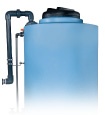FOG is an acronym for fats, oils and grease, particularly in the context of wastewater collection systems. FOG comes from meat fats and food scraps, cooking oil, shortening, lard, butter and margarine, gravy, and food products such as mayonnaise, salad dressings, sour cream and other foods high in fat.
Topics:
Chemicals
Poly Processing’s standard crosslinked polyethylene tank systems can withstand process temperatures up to 100°F — but that figure can be misleading, because there are different types of temperature to consider. For example, one of our customers in Texas asked about keeping a polyethylene tank outdoors in extreme temperatures:
Topics:
Value Added
No matter what chemicals you’re storing, it’s important to conduct routine storage tank inspections. These inspections are vital to help keep the chemical tanks, fittings, venting and accessories in good working condition—and to avoid costly surprise failures. Even if the polyethylene tank is relatively new, a routine and careful visual inspection is recommended.
Topics:
Installation and Field Service
Chemical storage tanks expand and contract due to seasonal temperature variations, pressure changes from loading and unloading the contents within the tank, and vibrations from pumps during filling and discharge from the storage tank.
Topics:
Fittings and Accessories
We’ve written several articles about the importance of protecting your chemical storage tank from aggressive chemicals. Mechanical stress can be just as significant, causing polyethylene chemical storage tanks to crack. Mechanical stress occurs when the tank’s structure is compromised after a physical impact with another object, over pressurization, improper venting, or rigid plumbing that doesn’t allow natural expansion and contraction of the tank.
Topics:
Value Added
Sodium hydroxide (NaOH), also known as caustic soda or lye, is a common inorganic compound that is typically used as a strong chemical base. Sodium hydroxide is used to manufacture soaps, rayon, paper, explosives, dyestuffs, and petroleum products. It is also used in processing cotton fabric, laundering and bleaching, metal cleaning and processing, oxide coating, electroplating, and electrolytic extracting.
Topics:
Tank Design and Materials,
Chemical Storage
As 2024 comes to a close, we take a moment to reflect on the valuable insights shared in our chemical storage tank blogs throughout the year. From advancements in storage solutions to critical safety measures, our goal has been to equip professionals with the knowledge they need to ensure the integrity of their chemical storage systems.
Topics:
Chemicals
Natural catastrophes can create significant and costly chemical storage tank damage. Earthquakes are a particular natural event that could lead to catastrophic risk, resulting in a complete failure of a chemical storage tank system.
Topics:
Installation and Field Service,
Fittings and Accessories
Maintaining the proper temperature of a chemical inside a polyethylene storage tank is often critical for safe storage. For example, sodium hydroxide and caustic soda need to maintain certain temperatures to prevent crystallization.
Topics:
Fittings and Accessories
Proper tank design is crucial to successful safe chemical storage. Purchasing a chemical storage tank isn’t just about selecting the right size — it is vital to design the proper tank configuration for the safety of your employees, the protection of the environment, and to leverage your investment.
Topics:
Value Added,
Tank Design and Materials



